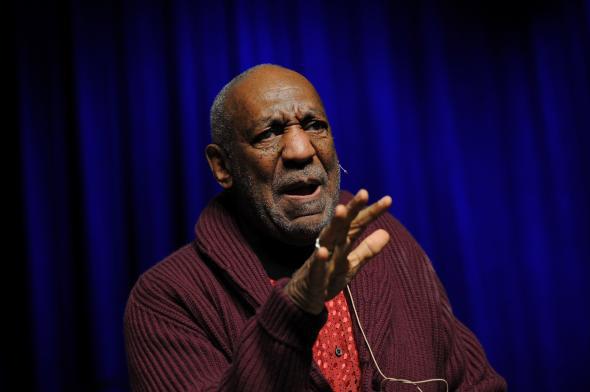This weekend marks the 30th anniversary of the The Cosby Show. In January, Slate’s TV critic Willa Paskin wrote about the delightful possibility of a new Cosby sitcom—it’s now planned for summer or fall 2015—in the lily-white, age-averse contemporary TV landscape.
NBC just announced that Bill Cosby will likely be returning to prime time next fall, 22 years after The Cosby Show ended, in a multigenerational family comedy with the sweater king playing the patriarch. In my corner of Twitter, where TV critics and reporters read the ratings like so many tea leaves, this announcement was met with a swift reminder of what happened last time NBC turned to the past for a future hit: This past September’s The Michael J. Fox show, which features the former Family Ties star in a perfectly adequate single-camera sitcom that has done absolutely nothing in the ratings, nostalgia for Alex P. Keaton be damned.
But Bill Cosby is not Michael J. Fox, even if, like Michael J. Fox, Cosby’s last two TV ventures—1993’s The Cosby Mysteries and 1996’s Cosby, the latter of which even reunited him with Phylicia Rashad—left nary a dent on popular culture. (And yet, in its first season Cosby had 16 million viewers; in its last, 8 million. Either number would be a sizable hit for NBC right now.) Cosby is not just an actor, he’s the creative force behind his series. (And, all due respect to Family Ties, it is no Cosby Show, which has aged beautifully and still makes me laugh.) Unlike Michael J. Fox, Cosby is not relying on someone else to assemble a decent show for him, he’s going to go out and make himself a show—and television could really use a Bill Cosby show right now.
The Cosby Show, about a large, affluent African-American family living in brownstone Brooklyn, was notoriously uncontroversial (though Cosby himself is far from apolitical). Still, its characters took great pride in being African-American—and in being extremely successful African-Americans at that. In contrast to the Norman Lear shows of the ’70s (Sanford and Son, Good Times, The Jeffersons), which addressed social issues overtly, the racial dynamics of The Cosby Show were usually there as subtext. But that subtext was plain to see to those members of the audience who wanted to see it. This subtlety helped make The Cosby Show a huge hit—it appealed to everyone—which in turn made the ’80s and ’90s a boom time for black sitcoms. (Nothing makes networks “brave” like success.) When The Cosby Show ended its run, The Fresh Prince, Family Matters, A Different World, Roc, Hanging With Mr. Cooper, Living Single, and Martin were all on the air.
By the mid to late-’90s, though, black sitcoms had largely moved to fledgling networks UPN and WB, where shows like Moesha, Girlfriends, Everybody Hates Chris, and Sister Sister aired. The Bernie Mac show aired on Fox for five years in the early aughts, but it was a rarity. There are currently no sitcoms on the major networks (i.e., not including BET and Tyler Perry’s work for TBS) that are primarily about black characters, even if there are more sitcoms than ever that contain at least one or two characters of color. (You can read Todd VanDerWerff’s piece explaining why and how this happened, but basically: Networks started to cater to advertisers who started to cater almost exclusively to affluent white people.) Twenty-two years after he left television, Bill Cosby remains one of the few people who can get a black family show on a network again.
This is particularly mind-boggling given that the influence of The Cosby Show is all over television. Cliff and Clair Huxtable were exemplars of the now nearly ubiquitous TV-parenting technique that combines equal parts love and aggravation, and, when practiced at the high level of Cliff and Clair, consists of very responsibly and reliably laughing at your children in instructive ways. No parent on any show from Modern Family to Mom does anything without Cliff and Clair hovering in the background, doing it a little better.
And Cosby’s recent stand-up material suggests that he is now positioned to be just as funny as a grandfather as he was as a dad. He seems to have been buffing the character of the slightly-doddering, cutting-in-flashes, exasperating and exasperated husband and grandpa for quite some time. On Letterman last week he did a bit that would have been much better on a sitcom than it was as a joke: He told a story about how he went to buy a piñata, said “Buenos Dias” to the woman at the store, was regaled with reams of Spanish he didn’t understand, and was reduced to answering her with “Feliz Navidad.” He has also been particularly focused on the commanding nature of wives. The nagging woman is one of sitcommery’s oldest, and most exhausted, tropes, but given that Cliff and Clair Huxtable were a high-water mark for solid and sexy long-term TV marriages, perhaps some of Cosby’s bits about being henpecked will get more balanced when the henpecker gets screen time of her own. Certainly, geriatric romance is wide open territory, and it’s hard to think of anyone better to explore it than Bill Cosby.
